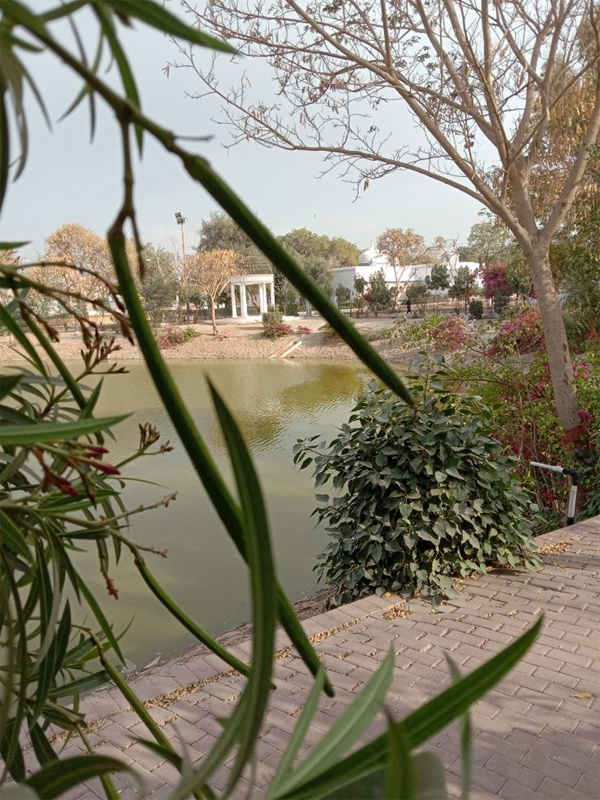Karar Lake
Karar Lake: A Sacred Symbol of Shah Abdul Latif Bhittai’s
Spiritual Journey
Nestled just 6 kilometers from the town
of Bhit Shah in Sindh, Karar Lake stands as a
sacred site that has deeply shaped the spiritual and psychological life of one
of South Asia’s greatest mystics and poets, Shah Abdul Latif Bhittai.
Revered not only for its serene beauty but also for its profound spiritual
significance, the lake became a place of solitude, reflection, and divine
communion for the saint. Shah Latif is believed to have spent a great deal of
time at Karar Lake, drawing inspiration from its tranquil waters and the
peaceful environment that surrounded it. The lake’s soothing qualities, both
psychological and spiritual, played a key role in his deep mystical reflections
and his creation of poetry that continues to resonate with people to this day.
Shah Abdul Latif’s Connection with Karar Lake
Shah Abdul Latif Bhittai was a deeply spiritual figure whose
poetry emphasized the search for divine truth, the longing for union with the
divine, and the peace that comes from spiritual devotion. The Karar
Lake, with its calm waters and surrounding natural beauty, provided the
perfect sanctuary for Latif to contemplate the mysteries of life and existence.
The lake’s quiet and serene ambiance offered an ideal setting for spiritual introspection. For Shah Latif, who often wandered the rural landscapes of Sindh, the lake was more than just a place to relax—it was a spiritual refuge, a space where he could immerse himself in prayer, reflection, and the pursuit of inner peace. It is believed that Latif would sit by the lake for hours, contemplating the nature of the soul and its journey toward divine realization. The stillness of the water and the natural environment around the lake acted as a kind of spiritual mirror, offering him moments of clarity and solitude in which he could commune with the Divine.

In his poetry, Karar Lake symbolizes peace,
purity, and the calm sought by the seeker on the path to spiritual awakening.
For Latif, the lake was not just a geographical feature but a metaphor
for divine serenity. His verses speak of the soul’s longing to immerse
itself in the infinite, much like water absorbing the vastness of the sky.
The water’s reflective nature allowed Shah Latif to meditate
on the inner workings of the human spirit, reinforcing his teachings on
transcending worldly attachments and embracing divine love.
Water as a Spiritual and Psychological Symbol
Shah Latif’s connection with Karar Lake resonates with a
deeper, universal truth: water has long been considered a symbol of
purification, reflection, and emotional release in spiritual traditions across
the world. The psychological impact of water, with its calming
effect on the mind, is well-documented in modern practices such as water
therapy or hydrotherapy. Studies suggest that being near
water can lower stress levels, improve emotional well-being, and promote a
sense of tranquility and connectedness. This makes water not just a physical
element but a psychological and emotional balm—qualities that would
undoubtedly have influenced Shah Latif’s time spent by Karar Lake.
The idea of water as a source of inner peace and clarity is
reflected in the writings of many poets and mystics across different cultures.
For example, the famous English poet William Wordsworth often
turned to nature, especially lakes, to find solace and inspiration. In his
poem “I Wandered Lonely as a Cloud,” Wordsworth describes a
field of daffodils beside a lake, which lifts his spirits and gives him “glee”
and peace. Though Wordsworth’s lakes are picturesque and joyful,
much like Karar Lake, they provide a reflection of the soul’s connection with
nature, offering emotional healing and a sense of belonging to something
greater.
Similarly, Rumi, another revered mystic poet,
frequently used the imagery of water in his poetry to illustrate the soul’s
journey toward unity with the divine. For Rumi, water was a symbol of purity
and the fluidity of the soul—constantly flowing toward its source. This
spiritual symbolism aligns closely with the imagery of Karar Lake in Shah
Latif’s work, where the lake’s still surface represents the tranquil soul that
seeks union with the Divine, a state of total peace and contentment.
Karar Lake as a Place of Pilgrimage and Reflection
Even after Shah Latif’s death, Karar Lake has
maintained its significance as a place of pilgrimage and reflection for
devotees. The serene waters and the landscape surrounding the lake continue to
inspire visitors who come in search of spiritual solace. Many come to the lake
to recite Shah Latif’s poetry, to meditate, or to engage in dhikr (remembrance
of God), the sounds of which ripple through the air, much like the gentle waves
of the lake itself.
During the Urs (death anniversary) of Shah
Abdul Latif Bhittai, Karar Lake becomes an important site of spiritual
activity. Pilgrims often make the journey to the lake as part of their
devotion, meditating by the water’s edge or participating in sufi music
performances that echo the saint’s spiritual message. The lake has
thus become a living symbol of the deep spiritual connection between
Shah Latif and the natural world around him, where every ripple of water seems
to carry the echo of his poetic words.
The Continued Relevance of Water in Spiritual Practice
The symbolic importance of water extends beyond the works of
Shah Latif and Rumi, continuing to influence spiritual practice around the
world. In Islam, water is a symbol of purity, often used in rituals such
as wudu (ablution) before prayer, underscoring its role in
spiritual cleansing. Similarly, many other cultures, from Hinduism to Buddhism,
regard water as a purifier and an essential element in their rituals.
The psychological healing power of being near water is also
well-recognized today, as researchers highlight the calming and restorative
effects of lakes, rivers, and oceans on the human psyche. Whether it is the
rhythmic sound of waves crashing against the shore, the sight of calm waters
reflecting the sky, or simply the stillness of a secluded lake like Karar,
water continues to offer a sense of peace, grounding, and connection.
Conclusion: A Spiritual and Psychological Sanctuary
In both spiritual and psychological terms, Karar
Lake continues to be a sacred site that holds the essence of Shah Abdul Latif
Bhittai’s teachings. The lake's waters represent not only peace and reflection
but also the eternal quest for divine truth and the purity that comes with
spiritual devotion. Just as water nourishes the physical body, it also
nourishes the soul, offering a space for emotional release, inner clarity, and
deep spiritual connection.
For Shah Latif, the time he spent at Karar Lake was a time
of divine communion, where he could contemplate the mysteries of the universe
and the path of the soul. His poetry, inspired by the tranquility of the lake,
still resonates with the hearts of those who seek peace and connection with the
Divine. Today, Karar Lake stands as a living testament to the enduring bond
between nature and spirituality, offering a serene space for reflection,
healing, and renewal.

